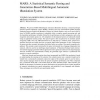308 search results - page 3 / 62 » Parsing a Natural Language Using Mutual Information Statisti... |
GECCO
2003
Springer
13 years 10 months ago
2003
Springer
The process of labeling each word in a sentence with one of its lexical categories (noun, verb, etc) is called tagging and is a key step in parsing and many other language processi...
NAACL
2007
13 years 7 months ago
2007
Previous work on discourse parsing has mostly relied on surface syntactic and lexical features; the use of semantics is limited to shallow semantics. The goal of this thesis is to...
FP
1995
13 years 9 months ago
1995
We describe a natural language parser that uses type information to determine the grammatical structure of simple sentences and phrases. This stands in contrast to studies of type...
SOUPS
2006
ACM
13 years 11 months ago
2006
ACM
Today organizations do not have good ways of linking their written privacy policies with the implementation of those policies. To assist organizations in addressing this issue, ou...
MT
2002
13 years 5 months ago
2002
We present MARS (Multilingual Automatic tRanslation System), a research prototype speech-to-speech translation system. MARS is aimed at two-way conversational spoken language trans...

